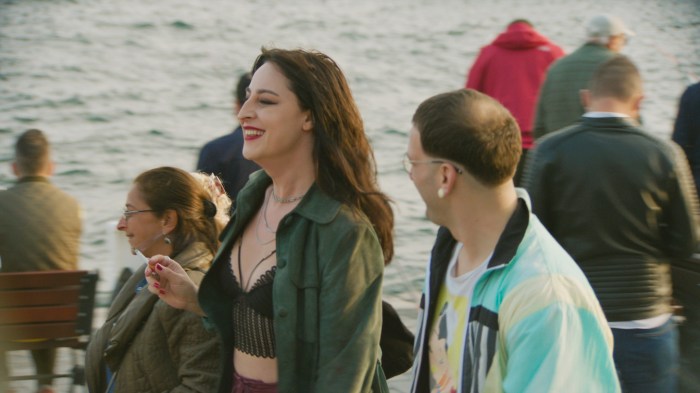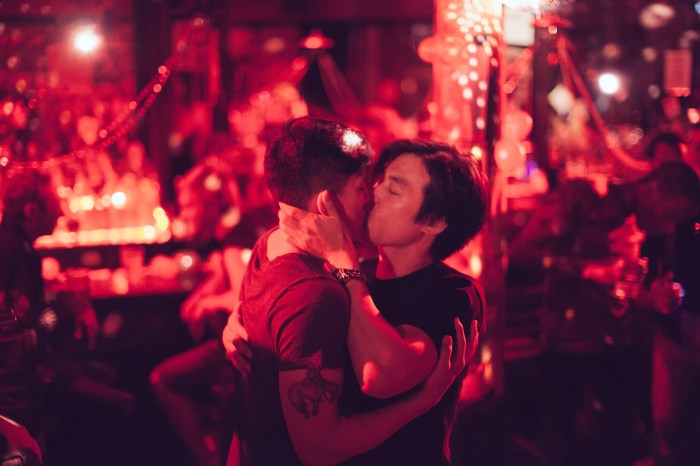Helen McCrory as Medea. | RICHARD HUBERT SMITH
The real drama in the now tenuously-United Kingdom this past week has been the build-up to the momentous Scots’ vote on September 18 about whether to become an independent nation again, a contest in which new polls say independence has a chance for the first time –– an outcome that would provoke a constitutional crisis.
London theaters, however, continue to dramatize the personal and political conflicts that have driven apart all kinds of people for centuries. Whatever the outcome of the vote in Scotland, London will endure as the world capital of theater in playhouses from the big and venerable to the tiny and new.
Euripides’ “Medea,” directed by Carrie Cracknell and starring Helen McCrory in a new version by Ben Power set in the present day, is an extreme example of how conflict resolution (Medea-tion?) is not for everyone.
It was a bit overwhelming to sit in the front row of the big Olivier house at the National Theatre, but I’d venture people in the rafters were also singed by McCrory’s intensity –– even though most of her unspeakable carnage is executed off stage. She is a walking wreck, unhinged by the rejection she suffers from her husband Jason (Danny Sapani) and by the order his new father-in-law, King Kreon (Martin Turner), issues that she get out of town.
Drama aplenty to rival even the real-life Scottish play
The nurse (Michaela Coel) who attends the ill-fated young spawn of Medea and Jason asks, “How can there be any ending but this?” In Greek tragedy, it is a rhetorical question. As we watch our own world accelerate into more and more savagery, I hope we can come up with some alternatives. The nurse says, “What a terrible god is love.” Kurt Vonnegut was fond of saying that we need a little less love and a lot more common decency.
“Medea,” just closed, will be transmitted to BAM on September 20 and on other dates around the country. Go toNTLive.com.
Based on his work at age 18 in a bread factory, “Toast” was the first professionally produced play by Richard Bean (“One Man, Two Guvnors” as well as “Great Britain,” about the recent tabloid scandals, now headed for the West End). Directed by Eleanor Rhode, “Toast” is set in a Beckettian antechamber to hell –– the lunchroom where overworked, flour-caked stiffs retreat from the ovens during the overnight shift limbo in which they toil.
A nerdy college student (John Wark) appears for duty and when he gets alone with one of the other men (such as the sad old lifer Nellie, wonderfully captured by Matthew Kelly), the word “toast” seems as if it will take on another meaning, as in “you’re toast.” But in the end, it is a tale of workers’ solidarity in the face of indifferent management acted by a splendid ensemble that gives voice to those who make our daily bread. Cheers to the innovative Park Theatre for reviving it. (To September 21.)
Lewis Reeves and Julian Ovenden in “My Night With Reg.” | JOHAN PERSSON
“My Night with Reg” at the Donmar (to September 27) is a hit production of Kevin Elyot’s 1994 AIDS-themed play about a group of white, middle-class gay men who knew each other in college 15 years before. It has critics comparing the gay theater pioneer –– who worked with Gay Sweatshop in the 1970s and died in June at 62 –– to Chekhov.
I was taken aback by how well the audience took to the first-act jokes that relied mostly on tired stereotypes about gay male sexuality. There are no women in the play, just men, some of whom give each other girlie names (something that went out in the ‘70s). And you know you’re in trouble when one of the most tiresome men, Daniel (Geoffrey Streatfeild), complains about the “boring” couple set to join them anon. “The Boys in the Band” did all this better 26 years earlier.
Little is done to make us care about these self-absorbed characters whose circle is being devastated by AIDS, though the drama itself becomes somewhat more absorbing once they drop the silly stuff.
The actors do well with the material, such as it is, notably Julian Ovenden (famous as one of Lady Mary’s suitors on “Downton Abbey”) as heartthrob John, oblivious to others’ desire for him and the damage his liaison with never-seen Reg could do to his friendship with Daniel.
It was a great antidote to attend the premier of the movie “Pride” directed by Matthew Warchus, the story of how Lesbians and Gays Support the Miners formed in 1984 to aid striking coal miners in a small town in Wales. Yes, AIDS was raging then, too, but these mostly young activists felt the need to show solidarity with those whom Thatcher was trying to starve back to work.
“Pride” stars greats such as Bill Nighy, Paddy Considine, and Imelda Staunton as union organizers, but the young gays –– notably Ben Schnetzer as their leader Mark Ashton and George MacKay as ingénue Joe — are incredibly moving in their quest to unite these disparate causes and peoples. Dominic West is also a standout as Jonathan, an older gay man with AIDS, who joins his lover, Gethin (out gay Andrew Scott, Moriarty on “Sherlock”), in the cause.
I haven’t teared up so much during a film since “The Best Years of Our Lives” about returning World War II vets. “Pride,” while not about our fight against AIDS per se, is about a lost time when the LGBT movement was grounded in support for other progressive movements –– as difficult as building those coalitions could be.
Shakespeare’s Globe has his multi-twinned farce “The Comedy of Errors” (to October 12). Directed by Blanche McIntyre, this is Shakespeare at his Marxist best –– the Marx Brothers, not Karl. It is a crowd-pleasing, knockabout production built on the most extreme of coincidences. It could have been even funnier had they scaled back the mugging and winking. Farce works best when the characters, however ridiculous, are still plausible.
The ensemble does a terrific job on the daunting task of delivering on the physical comedy. Forlorn patriarch Egeon (James Laurenson) seemed a bit shaky in the opening scene, but I would have been too had I ventured into Ephesus and been told I would be executed for being from Syracuse unless I came up with a ransom for myself within 24 hours.
“Bring up the Bodies” (Aldwych until October 4) from the Royal Shakespeare Co. is the second of two plays based on Hilary Mantel’s Man Booker-winning novels about the Tudor Court (the first was “Wolf Hall”), dramatized by Mike Poulton and centered on Thomas Cromwell (Ben Miles in his breakout role), Henry VIII’s number II.
We are a long way from “A Man for All Seasons” here with this gritty, intelligent, and suspenseful drama about the realpolitik of a man trying to preserve his own power and that of his boss (Nathaniel Parker’s Henry) — and ultimately his country. It is especially compelling because no one knows the whole truth about what Anne Boleyn (Lydia Leonard) did or did not do sexually with other men –– or whether her only crime was not producing a male heir.
Martin Freeman as Richard III. | MARC BRENNER
Martin Freeman (Watson on TV’s “Sherlock Holmes,” Bilbo Baggins in “The Hobbit”) is improbably but chillingly Richard III at the Trafalgar Studios (to September 27), in a modern dress version, directed by Jamie Lloyd, that gives new meaning to the term “office politics,” played as it is in its entirety in a government office.
The bullied Richard bullies –– and kills –– his way to the top, so mean to those he encounters on the way up that it is inevitable how they will treat him on his way down. Freeman –– an actor who, as a self-conscious nerd in the British version of “The Office,” originated the role John Krasinski would later play as an everyman heartthrob in America –– slicks back his hair and bares his teeth here in an impressive display of bloody-mindedness. Set in another tumultuous time –– the 1980s of Margaret Thatcher, also a single-minded ruler –– this “Richard” confirms the play’s enduring relevance. Gina McKee is especially good as the terrorized Queen Elizabeth Woodville.
Will Eno’s “Oh, The Humanity and Other Good Intentions” at the Tabard (to September 20), a pub theater, is the maiden production from End of Moving Walkway and helmed by its artistic director Paul Lichtenstern, who wrote that he wants to produce shows that “combine ambition with clarity.” They are on track with this production.
Eno, who shone on Broadway with “The Realistic Joneses” this past season, honed his off-kilter-style-that-makes-us-think in this 2007 work, as various characters take a turn in the spotlight for monologues –– from people articulating personal ads (“I don’t have to describe myself; this is what I look like,” a young man –– Joseph Stevenson –– says) to a PR spokesperson for an airline that just experienced a crash. “Being human is not listed as a cause of death,” she says.
It’s about how we might sound if we stripped ourselves of our myths. Really good stuff in a blessedly intimate space.
The Finborough, another pub theater, does new plays and old, but none that has been performed in London in the last 25 years. They’re good enough to send plays to the West End and New York. With the Scottish vote coming on September 18, they’re revived Robert McLellan’s 1948 “The Flouers o Edinburgh” (to September 27), set in mid-1700s Scotland in the wake of the Act of Union with England and Wales.
Written in Scots, a language still spoken by 1.5 million there, I easily missed half the words but never the engaging comedic drama of mostly upper middle class Scots deciding whether to adopt standard English. It was a privilege to be in such a cozy room with a large and accomplished ensemble as they dealt with complex social issues in a highly entertaining fashion. Especially fine are Lewis Rae as servant Jock, Jenny Lee as the lady of the house, dry Kevin McMonagle as Sir Charles, Finlay Bain as his would-be-politician son, and Andrew Loudon in two key roles.
Director Jennifer Bakst and her crew have brought an illuminating gem to life in a season where the debate over Scotland is at its peak.
COMING UP: “King Charles III” by Mike Bartlett (“Cock”), a smash at the Almeida, is now in the West End at Wyndham’s (to November 29). The National Theatre has a trilogy of hit plays about Scottish King James I, II, and III by Rona Munro at the Olivier (to October 29). Enda Walsh’s new “Ballyturk” is at the National’s Lyttelton with Cillian Murphy and Stephen Rea (to October 11). The National is kicking off its new Dorfman Theatre (the old Cottesloe) with the New York Public’s hit “Here Lies Love” (September 30 to January 8), David Hare’s new “Behind the Beautiful Forevers” set in Mumbai’s slums is at the Olivier (from November 10), and Byrony Lavery has a new adaptation of “Treasure Island” at the Olivier from December 3. From the National, Richard Bean’s “Great Britain,” about the Murdoch tabloid phone hacking scandals, plays the Haymarket from September 10. British indie movies (“Kinky Boots,” “Billy Elliot”) continue to be made into musicals, this time “Made in Dagenham,” about women striking at a UK Ford plant (at the Adelphi from October 9). Kander & Ebb’s “Scottsboro Boys” from the Young Vic is at the Garrick Theatre from October 4 with some original New York cast members, including Colman Domingo and Brandon Victor Dixon.





































